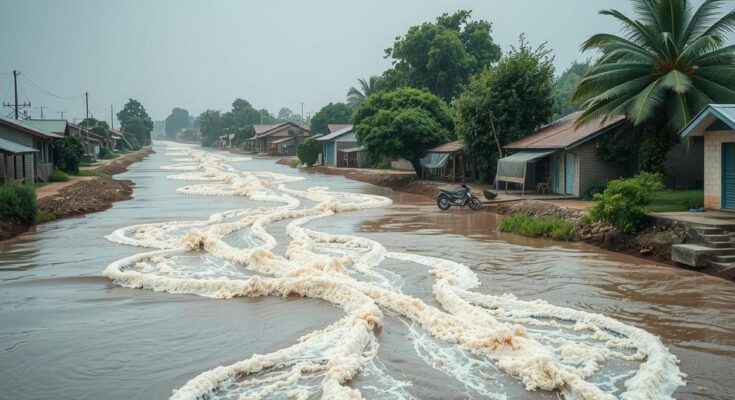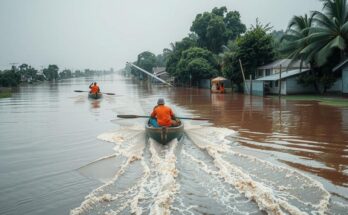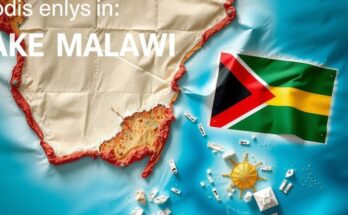The River Nile’s recent overflow has displaced thousands of residents in South Sudan, particularly affecting communities along the Jonglei Canal. Floodwaters have submerged villages and destroyed farmland, leading to a desperate humanitarian crisis marked by suffering, inadequate resources, and reliance on aid.
The overflowing River Nile is driving thousands of displaced individuals in South Sudan to seek refuge along the flood-prone Jonglei Canal. With the floodwaters submerging villages, destroying farmland, and leading to the loss of livestock, a new humanitarian crisis is unfolding. Bichiok Hoth Chuiny, a resident of the recently formed community in Pajiek, reflected on the extreme hardships faced, stating, “Too much suffering.” As the flood situation worsens, over 379,000 people have already been displaced this year, according to the United Nations humanitarian agency.
Historically, seasonal flooding affected the pastoral communities surrounding the Sudd wetlands, yet the scale of devastation has grown exponentially since the 1960s. This shift has drastically altered the livelihoods of the Dinka, Nuer, and Murle populations, diminishing their capacity to engage in traditional agricultural practices. Additionally, South Sudan, having gained independence in 2011 and subsequently plunged into civil conflict, is ill-equipped to address the mounting crises. The World Bank has characterized South Sudan as the world’s most vulnerable country concerning climate change impacts.
Factors contributing to the Nile’s overflow include the opening of upstream dams in Uganda, following significant rainfall that has increased Lake Victoria’s levels. The Jonglei Canal, conceived over a century ago to channel Nile water towards Egypt, has unintentionally served as a refuge for those displaced. Despite its initial purpose, the canal’s existence raises concerns about the neglect faced by populations now residing within its bounds.
Peter Kuach Gatchang, the paramount chief of Pajiek, indicated the dire lack of essential services, saying, “We have no school and no clinic here.” Most families now depend on aid, with the humanitarian support provided by organizations such as the World Food Program being critical to their survival. Residents like Nyabuot Reat Kuor have reported the devastating impact of flooding on agriculture, noting that their former village of Gorwai “has become a river.” Amid limited resources and diminishing international funding, food rations are being reduced, leading communities to rely on wild vegetation in desperate situations.
While health centers in areas like Paguong are struggling with insufficient supplies, local medical personnel endure economic challenges that hinder their ability to provide care. With civil servants often unpaid due to the ongoing economic crisis, the consequences are dire for affected populations as they navigate significant health risks, especially as snake bites become more frequent. In light of these overwhelming challenges, the need for sustained international assistance and immediate intervention is critical for the survival of thousands now living on the brink.
The article highlights the humanitarian crisis emerging from severe flooding caused by the overflowing River Nile, particularly affecting South Sudan and its vulnerable communities. As natural disasters become exacerbated by climate change and poorly structured government response, many are forced to abandon their homes and seek refuge along to bodies of water like the Jonglei Canal. The backdrop of ongoing civil unrest and economic instability further complicates the situation, leaving displaced populations reliant on sporadic humanitarian aid while facing myriad health and safety risks.
In summary, the flooding caused by the overflowing River Nile is displacing a significant number of residents in South Sudan, wreaking havoc on their livelihoods and underscoring the urgent need for humanitarian intervention. The historical context of flooding coupled with the long-term economic and political challenges facing the nation presents a grim reality for many villagers who find themselves living in precarious conditions. Without immediate support and sustainable solutions, the survival of these communities remains uncertain.
Original Source: www.independent.co.uk




